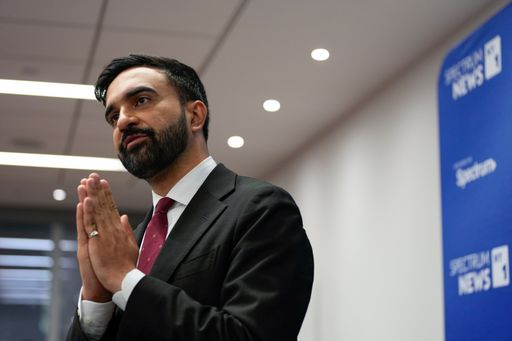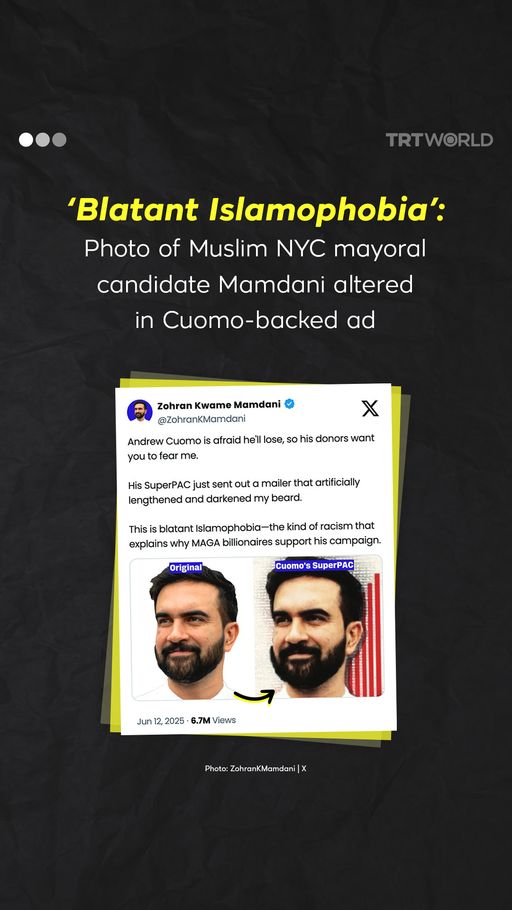Washington, DC — In the heart of America's largest metropolis, a soft-spoken 33-year-old Muslim socialist has shaken the bones of the political establishment.
Zohran Mamdani sent shockwaves through the US political class on Tuesday, dispatching former Governor Andrew Cuomo in a rout and emerging as the presumptive Democratic nominee for mayor of New York City.
This seismic ascent now positions him on the brink of leading one of the world's most storied cities.
"Democrats are looking for something fresh," Paul M. Collins, Jr., professor of political science at the University of Massachusetts Amherst, tells TRT World.
"Young Democratic voters in particular are rejecting the old guard of the party and see Mamdani as bringing a new perspective."
That perspective belongs to Mamdani, an Indian-origin, Ugandan-born, Queens-raised, state assemblyman who dismantled the very foundations of what used to be considered electable in NYC.
For Mamdani, there has been no corporate political action committee (PAC) money. No glossy TV ad blitzes. No deference to the centrist playbook that made household names out of Clintons and Cuomos.
"This is a turning point," Jordan Zane, a 26-year-old organiser from Crown Heights tells TRT World on the phone.
"We're not interested in the politics of survival anymore. We want dignity, homes, transit and truth. Zohran (Mamdani) seems to understand that."
Cuomo's fall, Mamdani's rise
Cuomo's attempt at a comeback was meant to be the story.
A dynastic name with deep coffers, network muscle, and, still, a smirk of confidence. But the shadow of scandal proved too long.
Cuomo, once the commanding governor who guided New York through the pandemic before resigning under a cloud of harassment allegations, now looked like a relic in a city teeming with younger voices.
"Mamdani’s victory," says Collins, "can be cautiously viewed as a sign that Democrats are turning away from the party's old guard and embracing Mamdani as a fresh voice."
Mamdani didn't win on his own.
He rode a wave — a cresting, churning coalition of white progressives from brownstone Brooklyn, working-class Asians and Latinos in Queens, and a kaleidoscopic mix of students and artists sprinkled across Manhattan.
Their connective tissue wasn't race or religion, but rage at the rent, subway delays, empty fridges, and an unshakeable feeling that the city wasn't theirs anymore.
Shift from old politics
His base had its blind spots, too.
He failed to win in several Black precincts where long-standing ties to centrist leadership remain strong, and he struggled in many Orthodox Jewish pockets, where his vocal support for Palestinian rights alienated traditional voters.
But that didn't stop the groundswell. His X posts — clear, confrontational — echoed his stance.
"Israel is committing a genocide," he wrote on October 31 last year. He's also stood firm in his backing of the Boycott, Divestment, and Sanctions (BDS) movement, calling it "the core of my politics, which is non-violence."
Those positions drew fire. Conservative commentators, Wall Street veterans, and political foes unloaded.
Dan Loeb, hedge fund billionaire and ardent Cuomo backer, fumed online: "It's officially hot commie summer."
Former Obama adviser Dan Pfeiffer, however, saw a different story: "What's happening in NYC is a blaringly loud message to those in the Dem establishment who still cling to old politics… too afraid to say what needs to be said."
The centre can't hold
Wall Street gasped. Midtown lobbyists picked up their phones. Conservative media lit up. And over on Truth Social, US President Donald Trump posted: "Zohran Mamdani, a 100% Communist Lunatic, has just won the Dem Primary… We've had Radical Lefties before, but this is getting a little ridiculous."
But Collins isn't convinced the sky is falling.
"The business community and wealthy elites will talk a big game about pulling out of New York City, but ultimately, I doubt it will happen. Those businesses chose New York for a reason. It's hard to imagine a single mayorship will be enough to get them to pull out of the Big Apple."
Still, the challenges ahead are real.
New York remains a complex city to govern. Public unions, real estate titans, police departments, and the ever-fickle winds of public opinion — all loom large.
"It's going to be challenging for Mamdani to find middle ground," says Collins.
"His best bet is probably to focus on what matters most to many people: the cost of living."
And that's where Mamdani has been most effective. He has spoken about rent freezes. Subsidised housing. Free transit.
"A lot of us young people are thrilled that Zohran wants to tax the super-wealthy and put government back where it belongs, in the lives of those this city has long ignored," adds Zane, a Mamdani voter.

The larger wave
It wasn't just Mamdani. Progressives held their ground across the city. Council members Shahana Hanif, Alexa Aviles, and Public Advocate Jumaane Williams all won re-election.
The signal was clear: NYC's political current is flowing left.
And the national Democratic establishment? Still blinking.
Trying to figure out how a 33-year-old with no endorsement from Schumer or Biden or Clinton or any bigwig and with a firmly pro-Palestine stance just became the presumptive mayor of NYC.
Rachel Williams, a DC-based strategist, tells TRT World, "Mamdani has been strident in his criticism of Israel's war on Gaza. He has also been a strong supporter of BDS movement."
"For many within the Democratic party," she adds, "he's now the test case, whether being unapologetically progressive is still electable."
As for what's next, the mayoral election is set for November 4.
Mamdani will face Republican nominee Curtis Sliwa, 71, red-beret-toting Guardian Angels founder who lost badly in 2021 and is widely expected to fall short again.
Williams puts it plainly, "What a time to be alive in America!"
"A man of South Asian extraction is all set to be the socialist mayor of the world's financial epicentre."




















